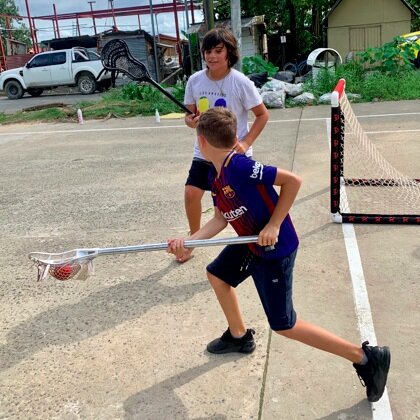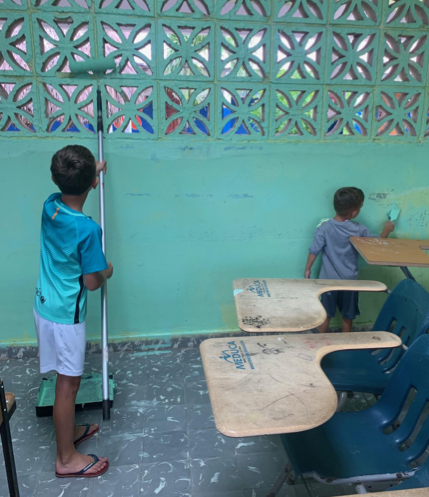I met Louie a year and a half ago when I first moved to Bocas. A hot-headed, sensitive and expressive twelve-year-old, Louie has always been historically hard on himself during practice. He is often volatile, his actions and his words wrought with negativity and frustration. This is particularly so when he messes up or when things go wrong in a drill or a scrimmage. And, as we know, this happens and will continue to happen as we work on our lacrosse skills… So, naturally the LtN Olympics were going to be an interesting skills test for Louie.
Quick rewind: Louie is an only child who started attending a school with his peers at the end of last year (up until then he was homeschooled on Isla Bastimentos where his family lives). One result of this change is that he is adjusting to interacting with other kids on a much more regular basis and in more structured environments than just free after-school time. Our practices fall under both of these situations. In effect, our programs push him to think, act and respond perhaps in different, more appropriate and controlled ways (and more often) than he is used to.
To offer an example, when Louie first started playing lacrosse, he had a tendency to throw his stick on the ground in anger whenever he’d mess up. As time has passed, Louie has managed to find other ways to control his attitude and emotions during lacrosse. A lot of this assistance has come from his teammates. Last week’s event of Tiro al Blanco was a great example of this personal and communal growth.
As Louie began the event, he soon became angry with himself because he wasn’t hitting the targets. Frustration showed in his actions and in his vocal expressions. After missing the first two cones, he took a breath and listened to the positive encouragement of his teammates. They were there building him up, not tearing him down like he was doing to himself inside his head. Then, we saw it: his composure changed. After pausing and listening to his team, Louie successfully hit the last two targets. This situation gave me the perfect segue to remind the LtN Panama team about positivity - particularly positive self-talk.
We discussed how one’s attitude (frustration and calmness) can severely impact one’s performance. For this reason, we need to remain calm and let mistakes roll off our backs when we find ourselves getting worked up. It was wonderful to see Louie learning from his teammates and acknowledging good practices for improving his performance, and his self-confidence.
After the discussion, Louie admitted that he was incredibly upset with himself in the beginning of the Tiro al Blanco event. But, he recognized that his frustration was not going to help him succeed. By listening to his teammates and by acknowledging how his attitude can affect his performance, Louie changed his outcome. He ended the event on a much better note! Now, that’s what a gold-medal day looks and feels like.
-Maria McDonough, Program Director













